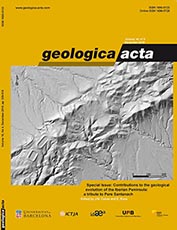3D structure of subsurface thrusts in the eastern Jaca Basin, southern Pyrenees
Article Sidebar

Main Article Content
clastic deposits. These contrasts promote the occurrence of various décollement levels and a decoupled style of deformation between intervals of different competence. A contour map for the top of basement reveals a complex structure with lateral variations of the number of thrusts and the displacement on these and local transverse elements.
Between the Gavarnie thrust at the southern edge of the Axial Zone and the Guarga thrust at the leading edge of the basement thrust system, three main other basement thrusts are defined below the north-eastern Jaca Basin, from South to North the Fiscal, Yésero and Broto thrusts. In the Meso-Cenozoic sedimentary cover, two low-angle thrusts are mapped
in the subsurface across the Upper Cretaceous-Eocene carbonates: i) the deep Oturia thrust, connected upsection to the emerging Oturia thrust known at the surface, and ii) the deep Jaca thrust, drilled by the Serrablo wells, and connected to the emerging Jaca thrust and Yebra de Basa anticline through a zone of disharmonic deformation. The deduced
subsurface geometrical relationships are consistent with the connection of the Gavarnie and Broto basement thrusts to the Priabonian-Rupelian Oturia and Jaca thrusts while the younger Yésero, Fiscal and Guarga basement thrusts emerge at the South Pyrenean thrust front of the Sierras Exteriores, active until the early Miocene. This study highlights the complex structural pattern that characterizes the deep structure of the South Pyrenean basin and the role of disharmonic deformation that challenges the resolution of the deeper thrust system without the help of seismic profiles.
Article Details
Drets d'autor
opyright
Geologica Acta is the property of the UB, GEO3BCN, IDAEA and UAB. Geologica Acta must be cited for any partial or full reproduction. Papers are distributed under the Attribution-Share Alike Creative Commons License. This license allows anyone to reproduce and disseminate the content of the journal and even make derivative works crediting authorship and provenance and distributing possible derivative works under the same or an equivalent license.
Author Rights
Authors retain the copyright on their papers and are authorized to post them on their own web pages or institutional repositories. The copyright was retained by the journal from the year 2003 until 2009. In all cases, the complete citation and a link to the Digital Object Identifier (DOI) of the article must be included.
The authors can use excerpts or reproduce illustrations of their papers in other works without prior permission from Geologica Acta provided the source of the paper including the complete citation is fully acknowledged.